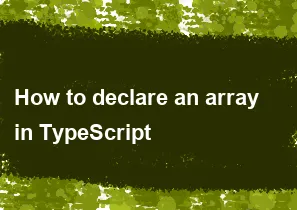How to declare an array in TypeScript

In TypeScript, you can declare an array using the following syntax:
typescript// Explicitly declare the type of elements in the array
let myArray: number[] = [1, 2, 3, 4, 5];
// Another way to declare an array with the Array<elementType> syntax
let anotherArray: Array<string> = ["apple", "banana", "orange"];
// You can also declare an array without initializing it
let emptyArray: number[] = [];
// Initialize an array later
emptyArray = [1, 2, 3];
// Arrays can contain different types of elements
let mixedArray: (string | number)[] = ["apple", 1, "banana", 2];
// TypeScript allows you to use the Array type with union types
let unionArray: Array<string | number> = ["apple", 1, "banana", 2];
In the examples above:
myArrayis an array of numbers.anotherArrayis an array of strings.emptyArrayis initially declared without any elements and later initialized with numbers.mixedArrayis an array that can hold either strings or numbers.unionArrayis another way to declare an array with a union type.
Remember that TypeScript provides static typing, so declaring the type of elements in the array allows the compiler to catch potential type errors during development. If you try to assign an element of the wrong type to the array, TypeScript will generate a compilation error.
-
Popular Post
- How to optimize for Google's About This Result feature for local businesses
- How to implement multi-language support in an Express.js application
- How to handle and optimize for changes in mobile search behavior
- How to handle CORS in a Node.js application
- How to use Vue.js with a UI framework (e.g., Vuetify, Element UI)
- How to configure Laravel Telescope for monitoring and profiling API requests
- How to create a command-line tool using the Commander.js library in Node.js
- How to implement code splitting in a React.js application
- How to use the AWS SDK for Node.js to interact with various AWS services
- How to use the Node.js Stream API for efficient data processing
- How to implement a cookie parser middleware in Node.js
- How to implement WebSockets for real-time communication in React
-
Latest Post
- How to implement a dynamic form with dynamic field styling based on user input in Next.js
- How to create a custom hook for handling user interactions with the browser's device motion in Next.js
- How to create a custom hook for handling user interactions with the browser's battery status in Next.js
- How to implement a dynamic form with dynamic field visibility based on user input in Next.js
- How to implement a dynamic form with real-time collaboration features in Next.js
- How to create a custom hook for handling user interactions with the browser's media devices in Next.js
- How to use the useSWRInfinite hook for paginating data with a custom loading indicator in Next.js
- How to create a custom hook for handling user interactions with the browser's network status in Next.js
- How to create a custom hook for handling user interactions with the browser's location in Next.js
- How to implement a dynamic form with multi-language support in Next.js
- How to create a custom hook for handling user interactions with the browser's ambient light sensor in Next.js
- How to use the useHover hook for creating interactive image zoom effects in Next.js